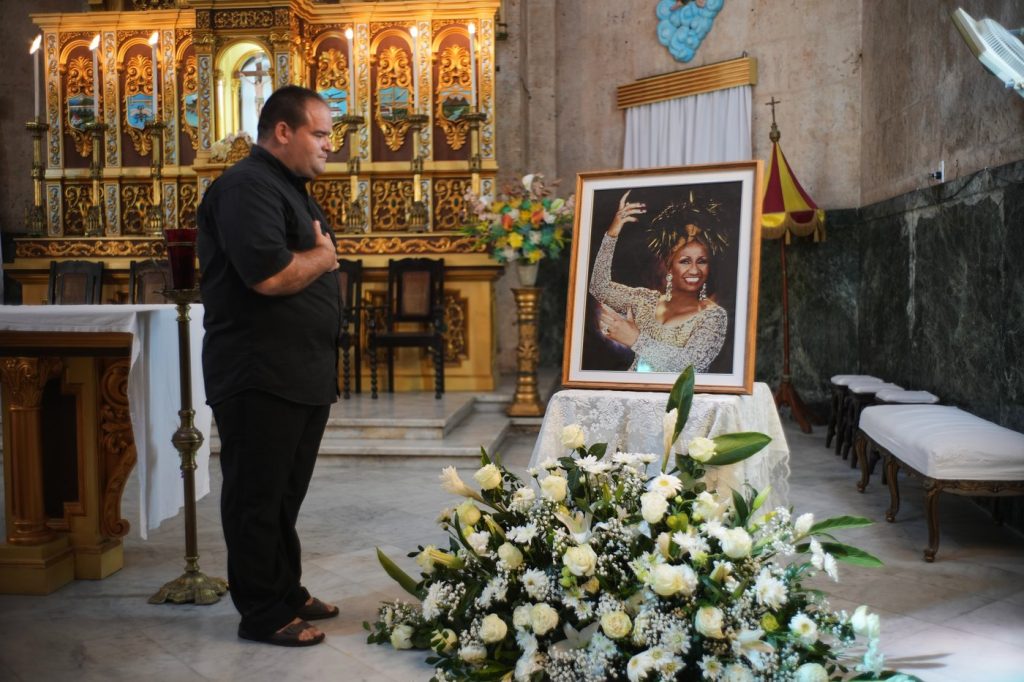Top Stories
Mass in Havana Celebrates Celia Cruz Amid Censorship Controversy

A Mass honoring the legendary salsa singer Celia Cruz drew hundreds of attendees in Havana on October 24, 2023, just days after Cuban authorities abruptly canceled a scheduled performance celebrating her centenary. This decision has sparked accusations of censorship, highlighting tensions surrounding cultural expressions in Cuba.
The Mass took place at the Basilica of La Caridad, where Father Ariel Suárez delivered a heartfelt homily. He praised Cruz as an “ambassador of Cuban music” and a vital figure in spreading Cuban culture globally. According to Suárez, Cruz’s vibrant spirit and music brought joy to many. He notably invoked the singer’s signature call, “Azúcar!” which resonated with the crowd.
Among those attending were prominent figures from Cuba’s artistic community, including singer Haila María Mompié and musician Alaín Pérez, as well as the United States Chargé d’Affaires, Mike Hammer. Hammer expressed his admiration for Cruz, stating, “Her songs give hope and joy, but she also wanted freedom for all the Cuban people, which is something we all desire.” Notably absent from the event were any representatives from the Cuban government or the Ministry of Culture.
Born in Havana on October 21, 1925, Cruz rose to fame as the “Guarachera of Cuba” and the “Queen of Salsa.” After leaving Cuba in 1960, she became a symbol for the Cuban exile community, passionately opposing the regime established by Fidel Castro. Cruz’s career flourished in the United States, where she maintained her status as a cultural icon until her death in 2003. Throughout her life, she faced significant challenges in her homeland, receiving minimal recognition from Cuban media due to her political stance.
The recent cancellation of a tribute performance planned by the theater group El Público at the Cuban Art Factory added to the ongoing controversy. Just hours before the event, the state-run National Center for Popular Music posted on social media that the performance would not occur, offering no reasons for the decision. The Cuban Art Factory later shared an image on Facebook of an empty chair under bright lights, symbolizing the tribute that would never be.
The post resonated with many, stating, “A work of art that never was, a chair, silence, and the art of resistance. Celia Lives.” Artists and scholars voiced their discontent online, criticizing the government’s actions as an example of political censorship. Musicologist Rosa Marquetti described the cancellation as a “chapter” in the ongoing struggle against censorship in Cuban culture.
In a recent concert, the Failde Orchestra had already paid tribute to Cruz, emphasizing her lasting influence on Cuban music. The tensions surrounding her commemoration reflect broader issues in Cuba, where cultural expressions are often met with scrutiny from the government.
As celebrations for Cruz’s centennial continue internationally, the contrast between global recognition and local censorship raises significant questions about freedom of expression and the legacy of one of Cuba’s most beloved artists. Cruz’s impact on music and culture remains profound, even as her connection to her homeland remains fraught with political implications.
-

 Education3 months ago
Education3 months agoBrandon University’s Failed $5 Million Project Sparks Oversight Review
-

 Science4 months ago
Science4 months agoMicrosoft Confirms U.S. Law Overrules Canadian Data Sovereignty
-

 Lifestyle3 months ago
Lifestyle3 months agoWinnipeg Celebrates Culinary Creativity During Le Burger Week 2025
-

 Health4 months ago
Health4 months agoMontreal’s Groupe Marcelle Leads Canadian Cosmetic Industry Growth
-

 Science4 months ago
Science4 months agoTech Innovator Amandipp Singh Transforms Hiring for Disabled
-

 Technology4 months ago
Technology4 months agoDragon Ball: Sparking! Zero Launching on Switch and Switch 2 This November
-

 Education4 months ago
Education4 months agoRed River College Launches New Programs to Address Industry Needs
-

 Technology4 months ago
Technology4 months agoGoogle Pixel 10 Pro Fold Specs Unveiled Ahead of Launch
-

 Business3 months ago
Business3 months agoRocket Lab Reports Strong Q2 2025 Revenue Growth and Future Plans
-

 Technology2 months ago
Technology2 months agoDiscord Faces Serious Security Breach Affecting Millions
-

 Education4 months ago
Education4 months agoAlberta Teachers’ Strike: Potential Impacts on Students and Families
-

 Science4 months ago
Science4 months agoChina’s Wukong Spacesuit Sets New Standard for AI in Space
-

 Education3 months ago
Education3 months agoNew SĆIȺNEW̱ SṮEȽIṮḴEȽ Elementary Opens in Langford for 2025/2026 Year
-

 Technology4 months ago
Technology4 months agoWorld of Warcraft Players Buzz Over 19-Quest Bee Challenge
-

 Business4 months ago
Business4 months agoNew Estimates Reveal ChatGPT-5 Energy Use Could Soar
-

 Business4 months ago
Business4 months agoDawson City Residents Rally Around Buy Canadian Movement
-

 Business4 months ago
Business4 months agoBNA Brewing to Open New Bowling Alley in Downtown Penticton
-

 Technology2 months ago
Technology2 months agoHuawei MatePad 12X Redefines Tablet Experience for Professionals
-

 Technology4 months ago
Technology4 months agoFuture Entertainment Launches DDoD with Gameplay Trailer Showcase
-

 Technology4 months ago
Technology4 months agoGlobal Launch of Ragnarok M: Classic Set for September 3, 2025
-

 Technology4 months ago
Technology4 months agoInnovative 140W GaN Travel Adapter Combines Power and Convenience
-

 Top Stories3 months ago
Top Stories3 months agoBlue Jays Shift José Berríos to Bullpen Ahead of Playoffs
-

 Science4 months ago
Science4 months agoXi Labs Innovates with New AI Operating System Set for 2025 Launch
-

 Technology4 months ago
Technology4 months agoNew IDR01 Smart Ring Offers Advanced Sports Tracking for $169










